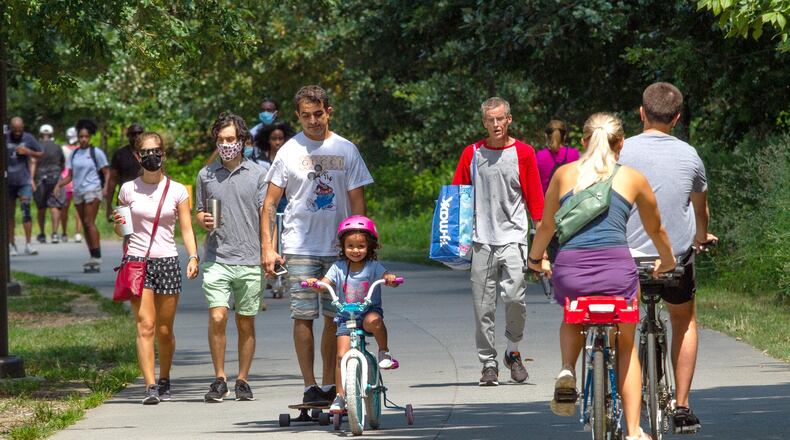An Atlanta City Council committee on Tuesday approved a measure that would impose an additional tax on businesses and apartment complexes around the Beltline to fund the completion of the trail by 2030.
The vote to advance the legislation, which is set for a vote by the full Council on Monday, comes as criticism swells over the proposal and how it could impact businesses and renters.
The “Special Service District” would increase property taxes for commercial and multifamily property owners near the Beltline path, including areas that aren’t yet paved. A property appraised at $1 million would pay an additional $800 per year, according to Beltline documents outlining the plan.
The increase could be in place for 15 to 20 years. Owner-occupied homes, condos or townhomes would not be subject to the tax hike.
Beltline leaders have heralded the plan as a critical tool that could bring in $100 million in additional revenue over the next 10 years. That would allow for the possible completion of the full, 22-mile trail loop potentially by 2029, a year ahead of schedule.
The additional funding would also free up an additional $45 million for affordable housing, create 20,000 additional jobs, and allocate $12 million toward support for small businesses, Beltline officials said.
During Tuesday’s community development committee meeting, Beltline CEO Clyde Higgs called the plan a “game-changer” and essential to finishing the loop on time. Mayor Keisha Lance Bottoms also supports the measure.
But residents, business owners and some elected officials have raised concerns in recent weeks that the proposal could place an unfair burden on small business owners and renters.
“We have a federal government passing a $1.9 trillion bill trying to help small businesses. At the same time, in the city of Atlanta, we’re considering imposing an additional tax that will impact businesses in ways that we don’t know,” Councilwoman Natalyn Archibong said during the meeting. “I just think the timing is off. And that doesn’t mean the idea is wrong.”
Residents submitted over an hour of comments related to the measure, and many criticized the extra tax. Some small business owners said the tax increase could impact their bottom line, while others said the tax would be unfair to neighborhoods that will not see any Beltline infrastructure installed for years.
Some who called in said they supported a finished Beltline trail and liked that the tax could help fund its completion.
In a recent Atlanta Journal-Constitution op-ed, Jim Fowler, the president of the Atlanta Apartment Association, said a tax increase for rental properties could result in increased rents for tenants. Beltline officials said during the meeting that any tax increase passed through to renters would be minimal.
Higgs said Beltline officials have held multiple public engagement meetings and have heard residents also raise concerns over transparency and accountability. An amendment was added to the legislation creating an advisory stakeholder committee to review its implementation.
The tax increase would apply to property located in the Atlanta Beltline Planning Area, a zone that includes the Beltline Tax Allocation District and properties within a half-mile on either side of the trail. A map released by the Beltline shows the majority of the land subject to the extra tax appears to be clustered on the Westside.
If passed by the full Council on Monday, the Special Service District would impact 3,555 properties — 2,945 commercial and industrial parcels and 610 apartment buildings.
About the Author
Keep Reading
The Latest
Featured




